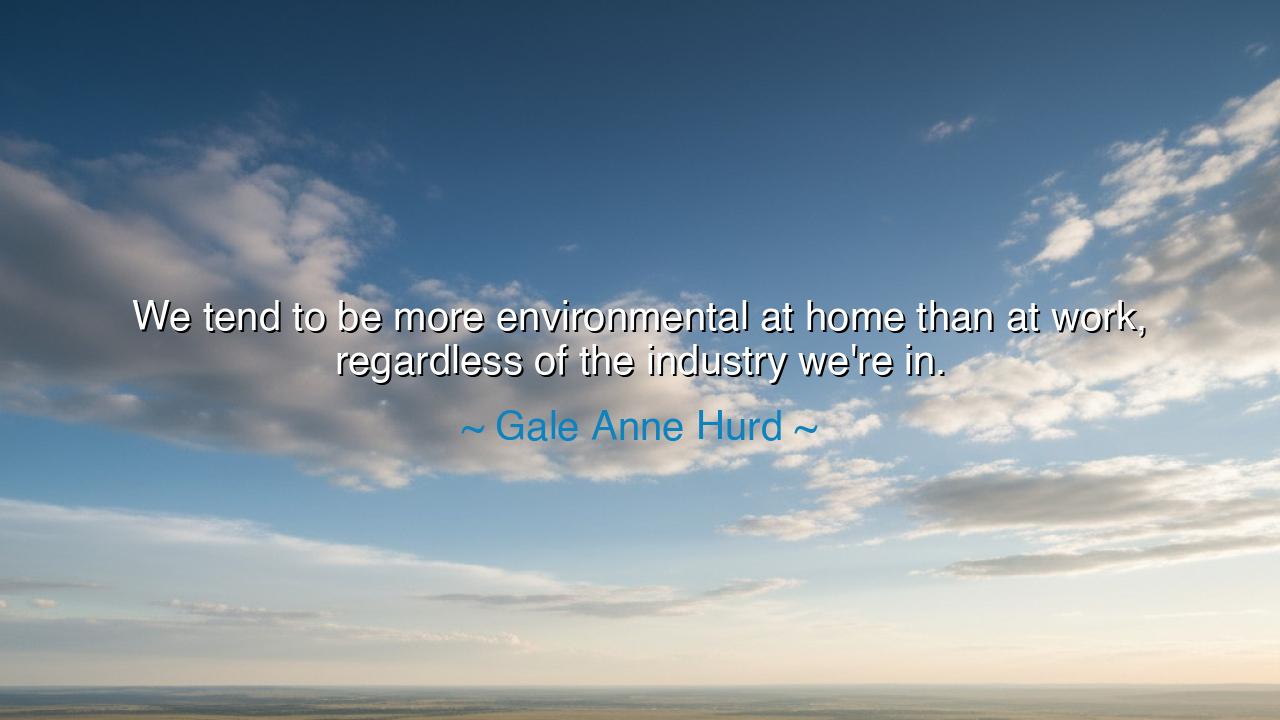
We tend to be more environmental at home than at work, regardless
We tend to be more environmental at home than at work, regardless of the industry we're in.






Hear the clear-eyed wisdom of Gale Anne Hurd, who declared: “We tend to be more environmental at home than at work, regardless of the industry we’re in.” These words strike at the heart of human inconsistency. For in the intimacy of our homes, we remember the value of the earth: we turn off lights, we recycle bottles, we conserve water. Yet when we step into the halls of labor—whether factory, office, or studio—too often the concern for the planet is left behind. The same hands that protect the earth in private neglect it in public, as though responsibility could be divided between two worlds.
The meaning of this saying lies in the conflict between individual action and collective responsibility. At home, choices feel personal: the waste bin, the faucet, the electricity bill. But in the realm of work, where corporations, deadlines, and profits rule, people feel small, as if their voice carries no weight. Thus, many surrender their stewardship, thinking, “It is not my place, it is not my problem.” Yet the earth does not divide itself between the personal and the professional—it suffers or thrives by all actions alike.
History offers its mirrors. In the early years of the Industrial Revolution, families in rural cottages lived frugally, conserving what they had, respecting the cycles of the seasons. But in the sprawling factories of the cities, smokestacks filled the air with poison, rivers ran black with dye and waste, and children labored in filth. The very people who lived modestly at home participated in destruction at work, not always by choice but by the momentum of the system. Here we see the truth of Hurd’s words: the split between private virtue and public neglect has long shaped the fate of the earth.
Yet there are also stories of hope. In modern times, movements within companies have shown how individuals, carrying their environmental habits from home into the workplace, can transform entire industries. Consider Patagonia, the outdoor clothing company, whose culture of environmental stewardship was shaped not by executives alone, but by workers who demanded sustainable practices, recycling, and fair sourcing. Their commitment to live the same values at work that they lived at home turned a single company into a model for global business. This is proof that when the wall between private and professional life is torn down, great change is possible.
The deeper lesson is one of integrity. A man or woman is not two beings, one at home and one at work. To live rightly is to live as one whole, carrying the same principles into every sphere of life. If we care for the earth in our kitchen but ignore its suffering in our office, then our care is only half-true. To be fully human is to embody one’s values everywhere—whether before family, colleagues, or strangers. For the earth sees no division; the same air we breathe at home is the air we poison at work.
The challenge, then, is courage. At home, it is easy to be virtuous, for none oppose you. At work, the cost may be higher: speaking out against waste, suggesting sustainable practices, or challenging superiors who choose profit over stewardship. Yet this is where virtue proves itself. History honors those who dared to live their values not only in private, but in public, even at cost to themselves. And so it will be with the defenders of the environment in our time.
The lesson for us is clear: do not separate your life into compartments of care and neglect. Live as one being, consistent in your reverence for the earth. Bring the spirit of your home into your workplace: conserve resources, speak for sustainability, inspire your peers. Small acts, multiplied in offices and industries, become rivers of change. The earth waits not for speeches but for integrity—the harmony of belief and action in every corner of life.
So remember Hurd’s words: “We tend to be more environmental at home than at work.” Let them stir you not to guilt, but to resolve. Let your private virtue flow into your public duty, until the line between them vanishes, and you stand whole. For only then will humanity rise as a true guardian of the earth—faithful not in part, but in all.






AAdministratorAdministrator
Welcome, honored guests. Please leave a comment, we will respond soon